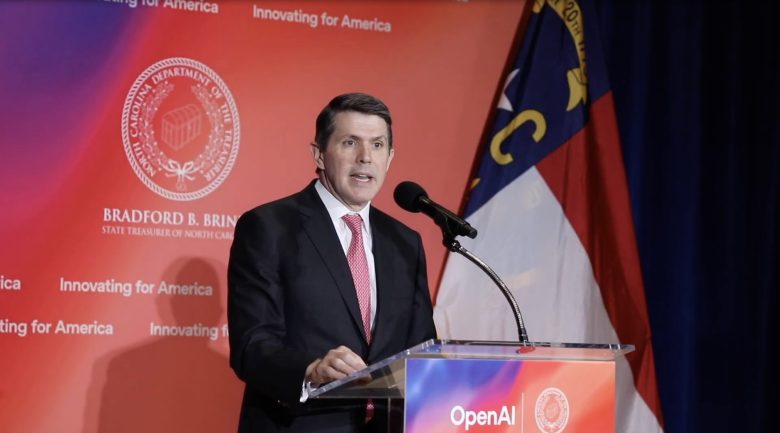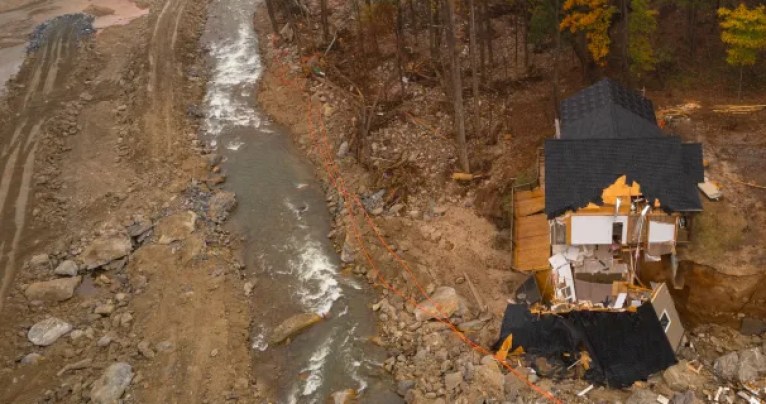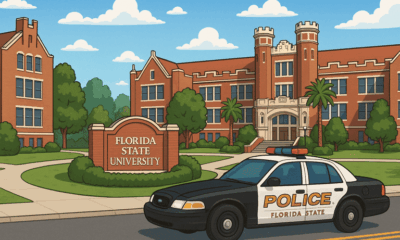News from the South - South Carolina News Feed
Trump administration considering sending American criminals to Central American prisons

SUMMARY: The Trump administration is exploring the idea of sending American criminals, particularly violent repeat offenders, to prisons in Central America. This consideration comes as President Trump claims a decline in border crossings while increasing military presence at the southern border. El Salvador’s acceptance of Venezuelan prisoners from the U.S. has sparked this proposal. Meanwhile, concerns arise over the deportation of Kilar Albrego Garcia, whose case has raised due process issues among Democratic lawmakers. Additionally, the White House aims to tackle fraud at the Social Security Administration with a new memorandum, ensuring only eligible individuals receive taxpayer-funded benefits.

President Donald Trump is maintaining his stance against facilitating the return of Kilmar Abrego Garcia, a Maryland man mistakenly deported and currently held in a notorious Salvadoran prison.
Trump has been touting a decrease in border crossings while expanding the military presence at the southern border, citing the complexity of the current situation.
_______________
Stay up to date with our social media:
WPDE on Facebook: https://www.facebook.com/WPDEABC15/
WPDE on Twitter: https://twitter.com/wpdeabc15
Subscribe to WPDE on YouTube: https://www.youtube.com/channel/UCn0sxo5Ocp8eSFqr9F1URpg/?sub_confirmation=1
Daily News Playlist:
https://www.youtube.com/playlist?list=PLCFE982C7D59E70C1
For more information, visit https://wpde.com/
Have a news tip? Send it directly to us:
Email us: abc15news@wpde.com
Call the Newsroom: 843.487.3001
WPDE is a SC based station and an ABC Television affiliate owned and operated by Sinclair Broadcast Group. WWMB is a SC based station and a CW Television affiliate owned and operated by Howard Stirk Holdings and receives certain services from an affiliation of Sinclair Broadcast Group.
#WPDE #ABC15News #ABC15 #WPDE15 #MyrtleBeach #trending #kilmarabregogarcia #deportation #deportationmistake #trumpadministration #elsalvador #cecot #nayibbukele #ICE #bordercrisis #trump #dueprocess
News from the South - South Carolina News Feed
Take a trip back in time to the birth of a nation

SUMMARY: Columbia, S.C. (WOLO) – Capital City/Lake Murray Country and 250 American Revolution: Lexington County invite media to cover “The Shot Heard Round The World” event on April 19, 2025, from 4:30 p.m. to 8:00 p.m. at Lexington’s Old Mill Pond Trail. This free, family-friendly event celebrates the 250th anniversary of the American Revolution, honoring the Battle of Lexington and Concord. Highlights include living history exhibits, lantern tours by Soda City Theatre Company, cannon demonstrations, and hands-on activities from local museums. A tribute featuring cinnamon whiskey will conclude the evening at 8:00 p.m., with a non-alcoholic option available.
The post Take a trip back in time to the birth of a nation appeared first on www.abccolumbia.com
News from the South - North Carolina News Feed
Briner hopeful AI will improve efficiency of state treasurer’s office

RALEIGH — In summer 1997, well before Brad Briner became state treasurer, he worked as an intern at the investment banking company Goldman Sachs.
While he was there, Briner needed to acquire data from the U.S. Department of Agriculture. His supervisor offered him a plane ticket to the nation’s capital and told him to go down to the USDA building to comb through paper records and get the information he needed.
But the late 1990s marked a new age in technology. Briner knew there was a more efficient way to get the job done.
“I turned to him and said: ‘Hey, there’s this thing called the internet and I can actually just pull it for you right here,’” Briner recalled.
[Subscribe for FREE to Carolina Public Press’ alerts and weekend roundup newsletters]
Now, the Republican thinks the country is on the cusp of another one of those moments with the emergence of artificial intelligence — and he doesn’t want North Carolina stuck in the past.
To that end, in late March, Briner announced the launch of a 12-week pilot program in partnership with industry-leading company OpenAI to explore how artificial intelligence can be integrated into the work of the Office of the State Treasurer.
The announcement was made amid a push from state lawmakers to pass regulations on the use of AI in industries such as health care.
The contrast in approaches is representative of a larger national debate over the technology.
As artificial intelligence rapidly integrates into the private sector, public officials are exploring the best, and safest, ways to use the technology.
‘First of its kind’
The public-private partnership was hailed as the “first of its kind” following a flashy press conference to announce the initiative at N.C. Central University, but this is far from OpenAI’s first venture into government affairs.
For at least five years now, the federal government has been working towards integrating AI into its workforce under both Democratic and Republican administrations.
It started with a December 2020 executive order from Donald Trump that mandated departments and agencies “design, develop, acquire and use AI in a manner that fosters public trust and confidence while protecting privacy, civil rights, civil liberties and American values.”
Joe Biden continued that goal during his presidency by promising to hire 500 AI experts across the federal workforce by the end of fiscal year 2025.
And Trump has picked up right where he left off since returning to office.
On April 3, the Office of Management and Budget issued further guidance to federal agencies on acquisition and use of AI tools in accordance with Trump’s original order from 2020.
Starting last year, OpenAI announced a year-long pilot program with 14 state agencies in Pennsylvania. In March, Democratic Gov. Josh Shapiro called the program’s results “highly positive,” with average time savings of 95 minutes per day.
North Carolina is the next state to follow suit through its pilot program at the treasurer’s office.
The agency might not seem like an obvious candidate for an AI-powered makeover, but Briner, who was elected as a Republican in November, has an approach to finance that is not traditionally conservative. During his campaign, he criticized his predecessors for their risk-averse investment strategies he claimed consistently underperformed compared to other states. Briner has also advocated investing part of the state’s pension fund in cryptocurrency.
But despite the buzz and uncertainty associated with artificial intelligence, Briner said this partnership with OpenAI is anything but risky. Instead, it’s more like his office is trying to see if it’s a good fit.
Future for Briner is now
There are no legally binding ties or financial promises between the two parties yet.
Briner and OpenAI chief economic officer Ronnie Chatterji — a Durham resident and former Duke professor — signed a 12-week, non-binding memorandum of understanding that laid out the limited scope of the pilot program.
Notably, Chatterji ran as the Democratic candidate for state treasurer in 2020 and lost to Republican incumbent Dale Folwell. He and Briner also served together on the finance committee of a private school their children attended.
The memorandum of understanding signed by Briner and Chatterji states that the department will not pay OpenAI for any “off-the-shelf” use of ChatGPT — OpenAI’s flagship AI chatbot. But they may come to a separate payment agreement for more advanced integration of OpenAI’s technology.
The agreement does not get into much detail about what happens at the end of the program other than saying that the agency will deliver a final report of its findings and future recommendations.
Briner told CPP he is not committed to continuing with the program unless he sees “productivity growth” in the coming weeks.
Briner promises to be ‘respectful steward’
Briner assured that one of his top priorities in overseeing the program is being a “respectful steward of data,” and the agreement stipulates that OpenAI will not be given access to private information.
That is one “bright red line” Briner promised the initiative wouldn’t cross.
“The big issue with AI in state government,” Briner said, “is one that we are deliberately side-stepping, which is how do you ensure data privacy for non-public data in the context of using AI? That’s a big, thorny, complicated question, but we wanted to see if we could get tremendous productivity out of this tool by applying it only in the divisions where we don’t use private data.”
So the OpenAI program will focus on publicly-available datasets such as unclaimed property held by the state and the financial audits of local governments.
The state treasurer oversees an unclaimed property fund that holds more than $1.4 billion consisting of, among other things, bank accounts, wages and contents of safe deposit boxes that have been abandoned for years and turned over to the state. North Carolina runs a program called NC Cash dedicated to returning unclaimed funds to their owners.
Briner said that the division could use OpenAI’s tools to perform deep data searches to more easily identify and return property.
Moreover, the State and Local Government Finance Division, which audits the more than 1,100 units of local government in North Carolina each fiscal year, could use AI to flag potential financial issues.
Still, exactly how artificial intelligence technology would be used hasn’t been hammered out yet, but Briner said the goal is to see if the productivity in those two divisions will have improved by the time the pilot program expires in mid-May.
A hard line on software
Over at the state legislature, lawmakers appear to be more wary of artificial intelligence.
A couple of bills filed this year by state Sen. Jim Burgin aims to place more regulations over the use of AI chatbots.
“I’m really concerned about AI overall and the speed (at which it’s growing),” said Burgin, a Republican from Harnett County who has been a leader in the General Assembly on AI-focused policy. “It’s almost like one of those Chia heads. It’s got a little bit of water and it’s growing everywhere, and we need to think about that.”
One of the bills sponsored by Burgin — Senate Bill 624 — would require operators of AI-powered chatbots in the health care sector to be licensed by the state. It would also require operators of any chatbot to inform users that the computer program is “not human, human-like or sentient.”
Furthermore, it would give a state attorney general the power to sue chatbot operators in violation of those regulations.
A spokesman for Attorney General Jeff Jackson declined to comment on the bill other than to say that the office was “currently reviewing” the legislation.
Burgin, who is the president and owner of an insurance company, said he’s not opposed to the use of AI. What he’s trying to do is put up guardrails to prevent harmful misuse of the emerging technology.
“Do I think that there’s some exciting things about it? Yeah, I think there’s unlimited possibilities.”
This article first appeared on Carolina Public Press and is republished here under a Creative Commons Attribution-NoDerivatives 4.0 International License.![]()
The post Briner hopeful AI will improve efficiency of state treasurer’s office appeared first on carolinapublicpress.org
News from the South - North Carolina News Feed
Budget proposal from NC Senate has Helene relief, income tax cuts

RALEIGH — In February, state economists warned of a looming fiscal cliff if the income and corporate tax rates continue to drop. Senate Republicans don’t exactly believe them. On Monday, they presented a budget proposal that doubled down on income tax cuts, not only ignoring advice to pause them, but also eliminating pesky revenue “triggers” getting in the way of further reductions.
The proposed budget would spend $32.6 billion in the first year and $33.3 billion during the second year (North Carolina operates on a two-year budget.). These are 5.8% and 2.1% year-over-year budget increases, respectively.
Overall, Senate Bill 257 shows “modest growth” to reflect North Carolina’s rising population and economy, Senate leader Phil Berger said.
[Subscribe for FREE to Carolina Public Press’ alerts and weekend roundup newsletters]
Tax policy and Helene recovery were the focuses of the 439-page proposal — the first major move in a months-long spending negotiation with the state House.
In a statement, the NC Budget & Tax Center, a nonprofit organization that documents economic conditions, blasted the proposal, saying it was “rooted in magical thinking and cruel cuts that will leave North Carolina unprepared for recessions, federal cost shifts and climate disasters.”
Meanwhile, the budget bill sped through a series of committee hearings Tuesday and will be fast-tracked to the Senate floor. If it passes the Senate, the House will likely make changes.
The final budget will almost certainly be crafted in a joint committee during the coming months.
Then, that version will go to Gov. Josh Stein’s desk, who may opt to sign or veto it, sending it back to the legislature.
Helene big part of budget proposal
It’s estimated that it will cost $60 billion to pay for Western North Carolina’s full Hurricane Helene recovery.
But the state doesn’t have that kind of money, Republican Sen. Ralph Hise, who represents nine counties on the state’s western border, told reporters during a press conference on Monday.
Instead, the working strategy is to load millions of dollars into the Hurricane Helene Disaster Recovery Fund, not to be spent now, but to be saved for future federal matching requirements.
The NC Senate’s budget proposal shifts $700 million from various state funds to the Helene Fund, but only reserves $25.5 million for specific purposes:
- $10 million to the Governor’s Recovery Office for Western North Carolina
- $5 million to the Division of Community Revitalization
- $8 million to the UNC Board of Governors to improve emergency response in Western North Carolina schools
- $2.5 million to the North Carolina community college system for enrollment loss
Hise said North Carolina is in a “good position” to meet matching requirements as it anticipates a variety of funds to come from the federal government.
The budget proposal also takes $634 million of underutilized transportation funds and reserves them for federal matching requirements for transportation infrastructure recovery.
It further divides $686 million in federal American Relief Act money between Helene-related clean water, drinking water and wastewater treatment system improvement needs.

Finally, it directs state agencies administering certain grant programs to prioritize applicants from the most impacted counties.
Since Helene, the state has used a significant portion of its “Rainy Day Fund.” So, the budget replenishes it to pre-Helene levels, to the tune of $1.1 billion.
Democratic Senate Minority Leader Sydney Batch isn’t pleased with the lack of actual spending, calling the budget proposal “a blueprint for neglect and cowardice.”
“Instead of investing in the people who make this state work, Republicans are continuing to hoard taxpayer dollars in a Rainy Day Fund — undermining critical agencies and ducking their responsibility by kicking tough decisions over to the House of Representatives,” she said in a statement.
Tax ‘triggers’
If you don’t meet your goals, well, why not just lower the goalpost?
That’s what Senate Republicans chose to do in their budget proposal. Under current law, the state needs to meet specific revenue “triggers” in order to drop the income tax rate another half percent each fiscal year.
Based on February’s Consensus Revenue Forecast, produced by the Office of the State Budget and Management, North Carolina met the revenue threshold for the first year of the biennium, but missed it by less than $100 million the second year.
While North Carolina is growing, the state budget office forecast that the downward pressure of income and corporate tax rate cuts, as well as the unpredictability of inflation and tariffs, would outweigh any revenue increases in fiscal year 2026-27.
The current income tax rate is 4.25% and is scheduled to drop to 3.99% in 2026.
After meeting the first-year trigger, the state is free to further drop the rate another half percent to 3.49% in 2027. But current law would force a pause in 2028.
The Senate budget works around that obstacle by eliminating the trigger from 3.49% to 2.99%.
The budget proposal leaves the next trigger, from 2.99 to 2.49%, in place for 2029, and adds two quarter percent drops the two following years.
Heba Atwa, the director of legislative advocacy and campaigns for the NC Budget & Tax Center, spoke out against the proposed cuts in a Tuesday legislative committee.
She said rate reductions would cost $13 billion annually. Furthermore, Atwa argued that lawmakers weren’t adequately considering the potential loss of federal funds. Last year, North Carolina received federal funding in an amount equivalent to its entire state budget ($30.8 billion). The next two-year budget cycle may be different.
“Y’all will be left holding the bag when North Carolinians come to you and say, ‘What happened to our services and our programs?’” Atwa said.
Berger isn’t convinced federal cuts will actually happen, but his caucus is monitoring things.
“I think we’ll be able to, if necessary, make adjustments, but it’s our belief that we have adequate reserves to address any scenario that is likely to occur,” said Berger, a Rockingham County Republican.
While the Senate’s proposed budget doesn’t account for potential federal funding cuts, it does take inspiration from Elon Musk’s cost-cutting agency: the Department of Government Efficiency. It dedicates $5 million so that State Auditor Dave Boliek could oversee a state version of DOGE, aptly named the Division of Accountability, Value and Efficiency (DAVE).
DAVE would determine whether state agencies and their vacant positions are necessary as well as how effectively they spend money.
Unlike its federal counterpart, the state auditor would not have the authority to eliminate programs or spending, but could offer recommendations to the General Assembly, Berger said.
This article first appeared on Carolina Public Press and is republished here under a Creative Commons Attribution-NoDerivatives 4.0 International License.![]()
The post Budget proposal from NC Senate has Helene relief, income tax cuts appeared first on carolinapublicpress.org
-

 News from the South - Arkansas News Feed7 days ago
News from the South - Arkansas News Feed7 days agoMeasles cases confirmed in Arkansas children after travel exposure
-

 News from the South - Alabama News Feed7 days ago
News from the South - Alabama News Feed7 days agoImpacts of Overdraft Fees | April 11, 2025 | News 19 at 10 p.m.
-

 Mississippi Today5 days ago
Mississippi Today5 days agoOn this day in 1873, La. courthouse scene of racial carnage
-

 News from the South - Georgia News Feed7 days ago
News from the South - Georgia News Feed7 days ago1-on-1 with Gov. Kemp’s Senior Advisor | Full interview
-

 News from the South - Missouri News Feed7 days ago
News from the South - Missouri News Feed7 days agoMom and son targeted in carjackings, stolen cars crime spree
-

 Local News6 days ago
Local News6 days agoAG Fitch and Children’s Advocacy Centers of Mississippi Announce Statewide Protocol for Child Abuse Response
-

 Local News5 days ago
Local News5 days agoSouthern Miss Professor Inducted into U.S. Hydrographer Hall of Fame
-

 News from the South - Arkansas News Feed7 days ago
News from the South - Arkansas News Feed7 days agoFederal investigators looking into cause of deadly NYC helicopter crash










































